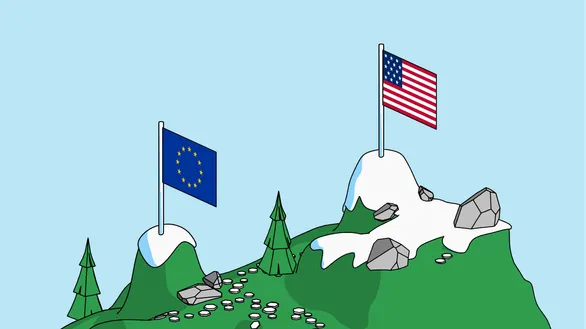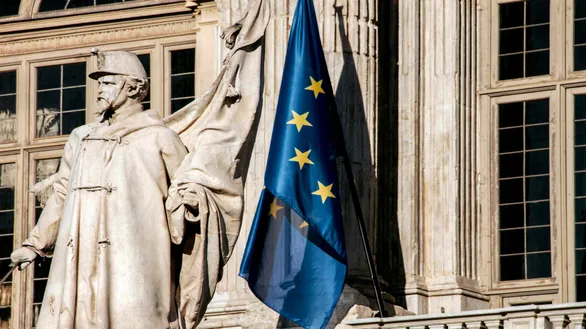Everything you need to know about the Directive on Empowering Consumers for the Green Transition (ECGT) including who’s covered and the risks of non-compliance.
In today's market, sustainability claims are abundant, with approximately 75% of products on the EU market carrying an implicit or explicit green claim. However, more than half of these green claims are vague, misleading, or unfounded, leaving consumers confused and skeptical about the authenticity of environmental labels. Similarly, almost half of the 230 ecolabels available in the EU have very weak or no verification procedures, further exacerbating the issue of greenwashing. In response to these challenges, the European Parliament has recently approved a groundbreaking new directive aimed at enhancing transparency and accuracy in environmental labeling.
The Directive on Empowering Consumers for the Green Transition (ECGT) represents a concerted effort to combat various deceptive tactics employed by companies that hinder consumers from making informed and sustainable choices. The directive is expected to be swiftly approved by the European Council, after which it will become law.
What is the aim of the legislation?
The primary objective of the new directive is to limit unfair commercial practices and restore trust and credibility in environmental labeling. It aims to ensure that consumers receive reliable information about the environmental impact of products. By prohibiting vague or misleading environmental claims and introducing stricter regulations on sustainability labels, the directive seeks to eliminate greenwashing practices and empower consumers to make informed choices.
Additionally, the legislation aims to level the playing field for businesses by setting clear standards and guidelines for environmental claims, thereby promoting fair competition and driving innovation towards more sustainable practices.
Association with the EU Green Claims Directive
The proposed new “greenwashing” directive is designed to complement other upcoming EU legislation. One such piece of legislation is the proposed Green Claims Directive, which aims to streamline the evaluation of voluntary environmental claims and to lay out more precise conditions for using environmental claims.
Which companies are affected?
The proposed “Greenwashing” directive is set to take effect from early 2026, and will apply to a wide range of businesses across various sectors selling products or services in the European Union. This ranges from multinational corporations to small and medium-sized enterprises. In short, any company making environmental claims about their products or services, such as 'eco-friendly,' 'natural,' 'biodegradable,' and 'climate-neutral,' among others, will be subject to the regulations outlined in the directive.
Each EU member state will have two years to transpose the directive into national law, selecting a "national competent authority" to oversee environmental labeling schemes. These authorities can be existing regulators or newly established organizations. Notably, due to Brexit, the rules do not apply in the UK. However, as many UK-based businesses sell into EU markets, the directive is expected to have a ripple effect on product messaging seen in Britain.
What do businesses need to do to comply?
To comply with the new directive, businesses must take proactive measures to ensure that their explicit environmental claims are accurate, transparent, and backed by credible evidence. Key steps include:
-
Conducting thorough assessments of products' life cycles to provide specific details about raw material sourcing, production methods, and waste management practices.
-
Verifying the accuracy of every environmental claim by ensuring they are based on approved certification schemes or established by public authorities. Manufacturers can label a product as "eco" or "green" only if the entire product demonstrates a measurable improvement over conventional ones and is certified by a reputable scheme like the EU Ecolabel.
-
Enhancing transparency in environmental reporting and communication with consumers by providing clear and accessible information about the environmental impact of products. All claims must be made based on widely-recognized scientific evidence.
-
Training staff to understand and comply with the requirements of the directive, including guidelines for making environmental claims and responding to consumer inquiries.
By implementing these measures, businesses can not only meet their legal obligations under the directive but also build trust with consumers and differentiate themselves in the marketplace.
What does the directive not cover?
Despite its strides in regulating environmental claims, the EU directive falls short in certain areas.
Early obsolescence
Campaigners express disappointment over the absence of measures to prohibit early obsolescence – i.e. encouraging replacement purchases through limiting the lifespan of products. This represents a missed opportunity to promote a circular economy.
Enhancing product longevity
Although the law mandates disclosure of product repairability and durability information, it lacks provisions to enhance product longevity or repairability.
What is the risk of non-compliance?
Non-compliance with the EU's greenwashing legislation poses significant risks for businesses, including:
-
Reputational damage: Companies found to be non-compliant may suffer reputational harm, leading to loss of consumer trust and loyalty.
-
Legal consequences: Non-compliant companies may face legal actions, fines, or other penalties for violating the regulations, resulting in financial losses and damage to brand reputation.
-
Market access restrictions: Failure to comply with the regulations may result in restricted access to the EU market, limiting business opportunities and hindering growth potential.
-
Investor scrutiny: Investors increasingly consider environmental factors in their decision-making process, and non-compliance may deter investment and affect the company's valuation.
The future of trustworthy environmental claims?
The approval of the Directive on Empowering Consumers for the Green Transition (ECGT) marks a significant milestone in the ongoing efforts to promote transparency and integrity in environmental labeling. By setting clear standards and guidelines for environmental claims, the directive aims to empower consumers to make informed choices and drive the positive environmental performance of businesses worldwide.
How Sweep can help
Using our platform, you can:
-
Conduct a thorough assessment of your product environmental footprint
-
Proactively identify and resolve sustainability issues to avoid potential risks of non-compliance.
-
Get a real-time overview of your supply chain and ensure that your suppliers meet your sustainability targets.
-
Set emission reduction targets and be confident of achieving them by simulating and launching relevant initiatives.
-
Ensure your sustainability information is reliable by having it verified by a third party before going public.
Find out more about how we can support you.




